17 Companion Plants That Thrive With Sunflowers
Sunflowers make a stunning centerpiece in any garden, and the right companions can make them even more impressive. Certain plants can support the growth of sunflowers by attracting pollinators or providing necessary nutrients. With a little planning, you can enhance your garden’s health and beauty by pairing sunflowers with compatible plants. These companions can help create a balanced, thriving garden environment. By incorporating these plants, you will enjoy a fuller, more vibrant garden.
This post may contain affiliate links, which helps keep this content free. Please read our disclosure for more info.
Beans
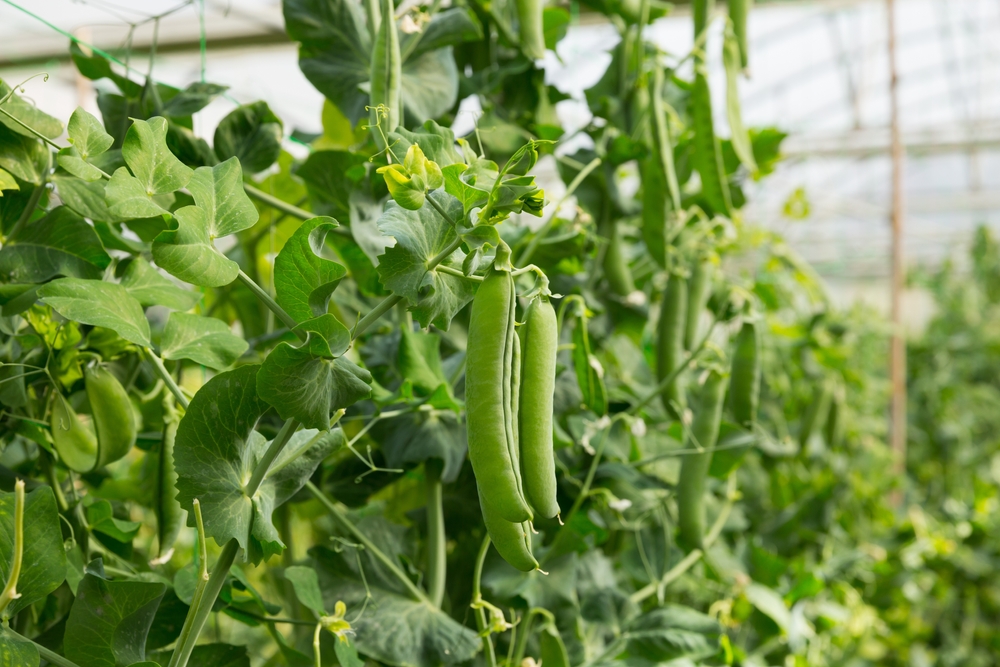
Beans are a great companion for sunflowers because they help fix nitrogen in the soil, which sunflowers need to thrive. They grow quickly and can provide a natural fertilizer for sunflowers. These plants typically take about 2-3 months to mature, depending on the variety. Beans also have a climbing nature, which allows them to grow up the sturdy sunflower stems, saving space in the garden. Additionally, beans attract beneficial insects and help in preventing soil erosion, making them an excellent choice.
Beans come in various types, such as bush beans and pole beans, each offering unique benefits. The pole beans, in particular, will wind around the sunflower stalks, offering additional support to the sunflower as it grows. They also provide a great harvest of nutritious beans, making them a practical and beneficial addition to your garden. Beans are easy to grow in most climates, making them suitable for many gardeners. Their quick growth and ability to improve soil health make them ideal companions for sunflowers.
Basil
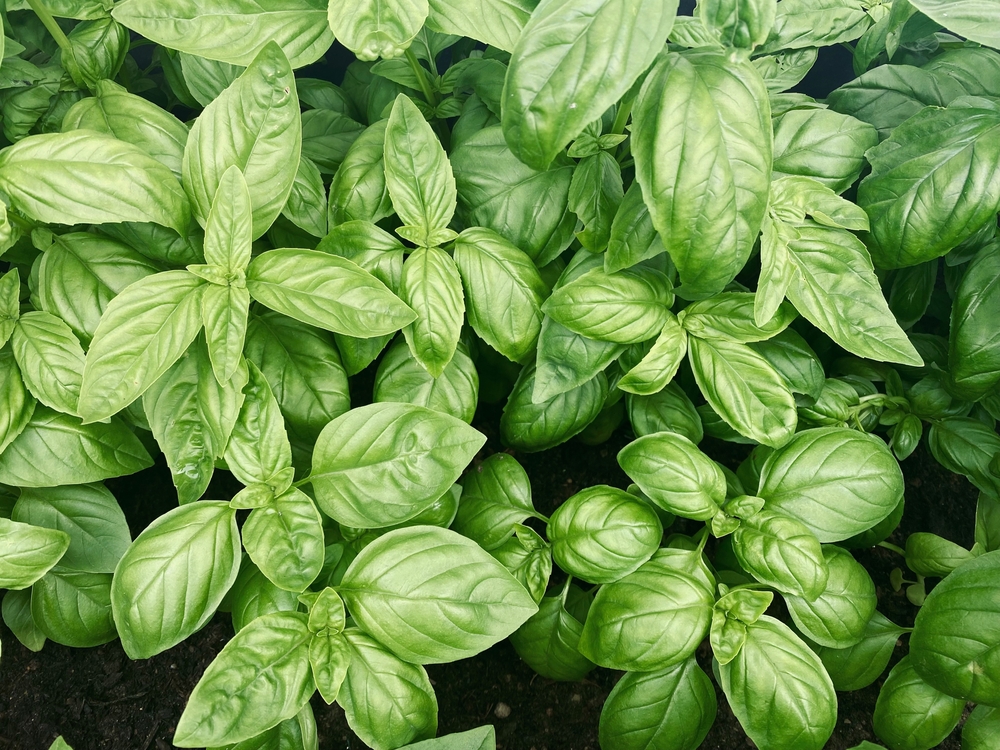
Basil is a fragrant herb that can serve as an excellent companion for sunflowers by attracting beneficial insects, including bees and ladybugs. These insects help pollinate the sunflowers and keep pests away, ensuring healthy growth. Basil typically takes about 2 months to grow, which makes it a quick and easy addition to the garden. It also enjoys the same sunny conditions as sunflowers, making it an ideal match. The strong aroma of basil can help repel certain pests, such as aphids and mosquitoes, providing a natural form of pest control.
Basil pairs well with sunflowers in both garden aesthetics and function. As a companion, basil’s small size does not compete with the tall sunflower, and it enhances the overall appearance of your garden with its vibrant green leaves. Additionally, basil’s ability to boost the soil with its fragrant oils makes it a beneficial plant to have nearby. Its fast growth and ability to flourish in full sun make it a versatile plant in your sunflower garden. With minimal care, basil will grow and thrive alongside sunflowers, helping them flourish.
Marigolds
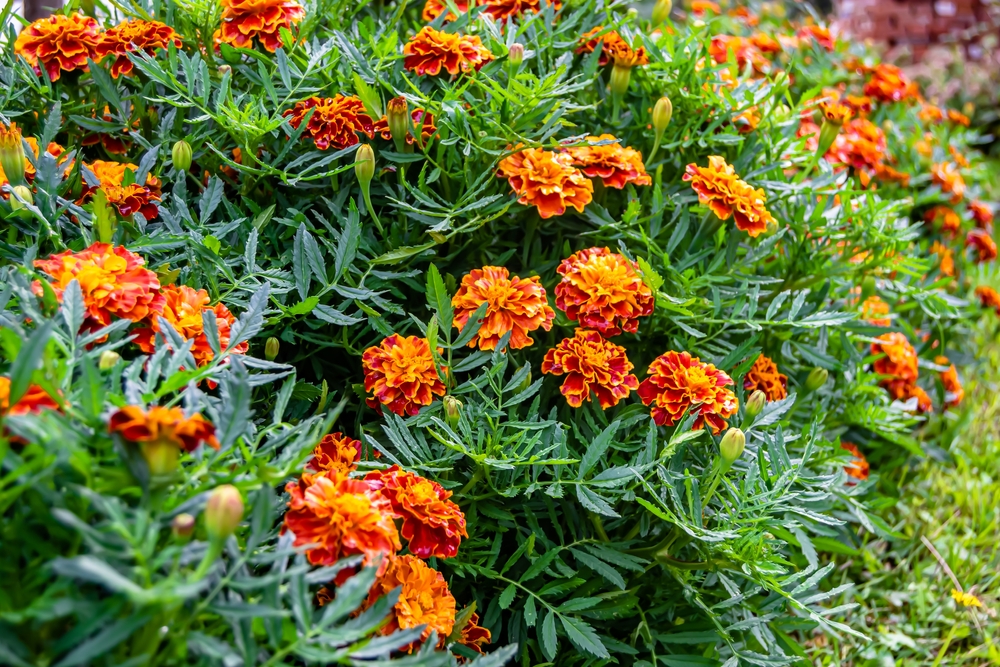
Marigolds are a fantastic companion for sunflowers due to their pest-repelling qualities. They naturally ward off harmful insects such as aphids, slugs, and nematodes, which can damage sunflowers. Marigolds take about 2 months to reach full bloom, making them a fast-growing addition to your garden. Their bright, colorful flowers create a striking contrast against the yellow sunflower petals, making them visually appealing. These flowers also attract pollinators, improving the health of your entire garden.
Marigolds work well alongside sunflowers because their strong scent repels pests without harming the sunflowers or other plants. They do not compete for space and can even be planted in the same bed as the sunflowers, filling empty spots with vibrant color. The presence of marigolds will also help improve the soil’s overall health, as they release substances that suppress harmful pests. This makes them not just an ornamental plant, but also a functional one in the garden. Their low-maintenance nature makes marigolds an easy addition to any sunflower patch.
Corn

Corn is another tall plant that pairs well with sunflowers in the garden. It shares similar growing conditions, requiring plenty of sunlight and space to thrive. Corn typically takes about 3-4 months to grow to maturity, which aligns well with the growing season of sunflowers. The tall stalks of corn can act as a windbreak for sunflowers, helping to protect them from strong winds that might otherwise damage the tall sunflower stems. This creates a symbiotic relationship where both plants provide mutual support.
The size of corn stalks makes them an excellent companion for sunflowers, as they grow tall and offer protection. Corn also helps to create a natural barrier around the sunflowers, preventing some pests from reaching the flowers. As corn and sunflowers share similar soil needs, they do not compete for nutrients, making them a perfect match for companion planting. Corn’s large leaves also provide a little shade, which can help keep the soil cool and prevent it from drying out too quickly. The combined height and structure of these plants add a unique element to the garden.
Nasturtiums
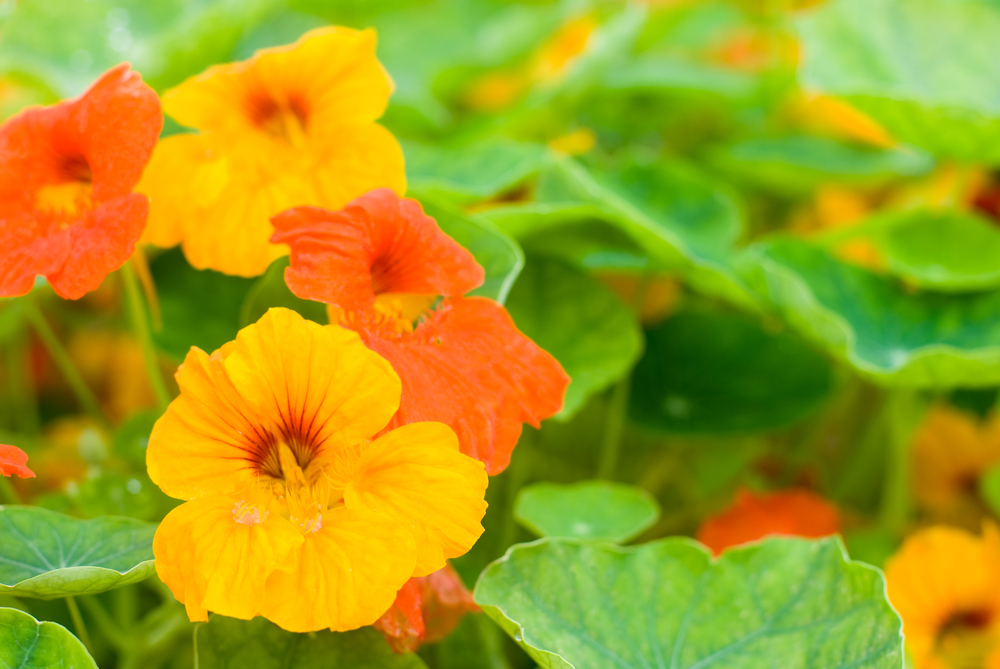
Nasturtiums are known for their bright, vibrant flowers and their ability to deter pests. They attract aphids, snails, and other pests away from your sunflowers, acting as a natural pest trap. Nasturtiums typically take 2-3 months to grow, depending on the variety, and they do well in full sun. Their trailing vines and colorful blossoms complement the sunflowers without taking up too much space. Nasturtiums are edible, with their peppery flavor often used in salads, making them both a decorative and practical choice.
By growing nasturtiums around the base of sunflowers, you can create a natural pest control barrier that protects the sunflowers from harmful insects. Their fast-growing nature makes them an ideal companion for sunflowers, as they fill in space while providing a splash of color. The flowers and leaves are also attractive to beneficial insects like bees and butterflies, which help pollinate the sunflowers. Nasturtiums thrive in the same sunny conditions as sunflowers, making them easy to maintain alongside them. These plants are perfect for gardeners looking to add both beauty and function to their garden.
Zinnias
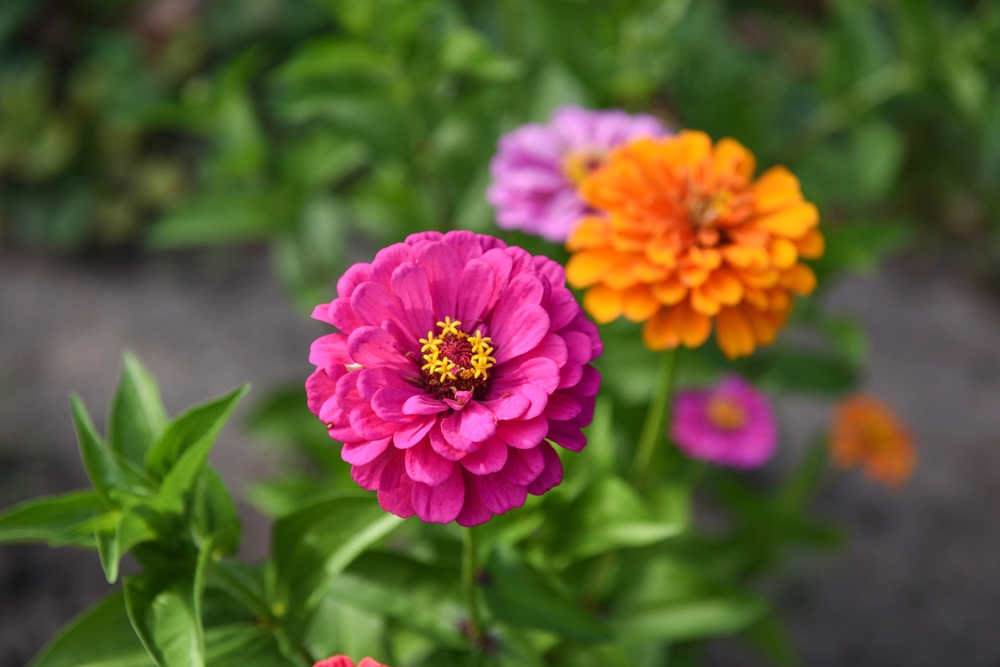
Zinnias are colorful, hardy flowers that are great companions for sunflowers. They attract pollinators like bees and butterflies, which help increase the pollination rate of sunflowers, leading to more abundant blooms. Zinnias typically grow in about 2-3 months, making them a quick-growing companion for your sunflowers. Their vibrant flowers create a beautiful contrast with the large yellow sunflower petals, enhancing the visual appeal of your garden. Zinnias are also resistant to pests, which helps protect the sunflowers from damage.
Growing zinnias near sunflowers can help keep your garden healthy and thriving. They do well in the same sunny environment and do not compete for resources, as they have a smaller root system. Zinnias are easy to grow and require minimal maintenance, making them perfect for both beginner and experienced gardeners. These plants also add a bright, cheerful element to the sunflower garden with their wide range of colors. With their ability to attract beneficial insects and resist pests, zinnias make an excellent companion for sunflowers.
Cucumbers
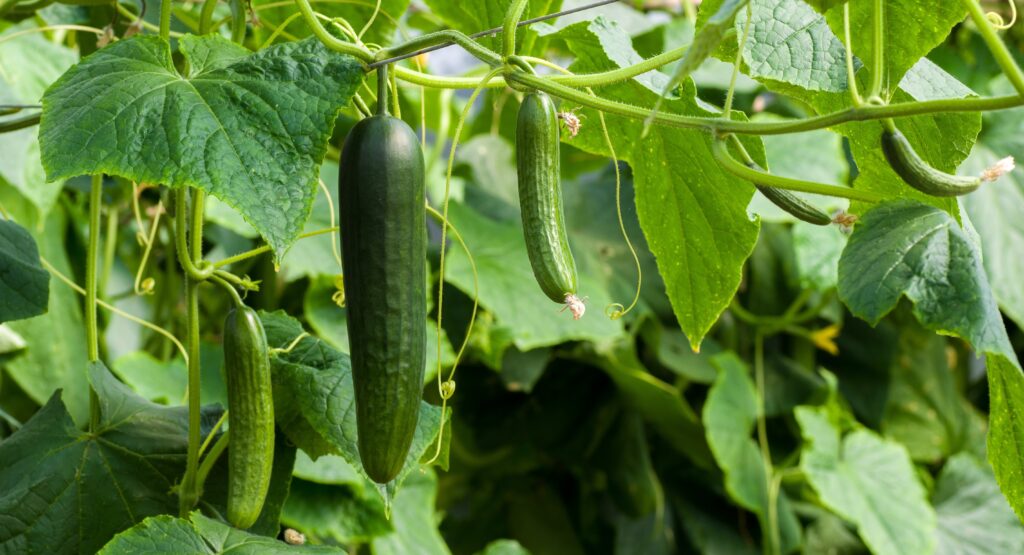
Cucumbers are an ideal companion for sunflowers because they help to shade the base of the sunflowers, keeping the soil moist and cool. The sprawling nature of cucumbers allows them to cover the ground and reduce weed growth, which can compete with sunflowers for resources. Cucumbers typically take around 2-3 months to mature, making them a quick-growing companion. The vines also produce edible fruit that is a refreshing addition to the garden harvest. Growing cucumbers alongside sunflowers provides both a functional and edible pairing.
Cucumbers benefit from the same growing conditions as sunflowers, such as full sun and well-draining soil. Their leaves provide shade to the base of sunflowers, helping to reduce water evaporation and prevent the soil from drying out too quickly. As cucumbers spread along the ground, they can also prevent weeds from growing and stealing nutrients from the sunflowers. These plants are low-maintenance and do not require extensive care, making them an excellent companion for busy gardeners. In addition, cucumbers help to support a diverse and productive garden.
Dill
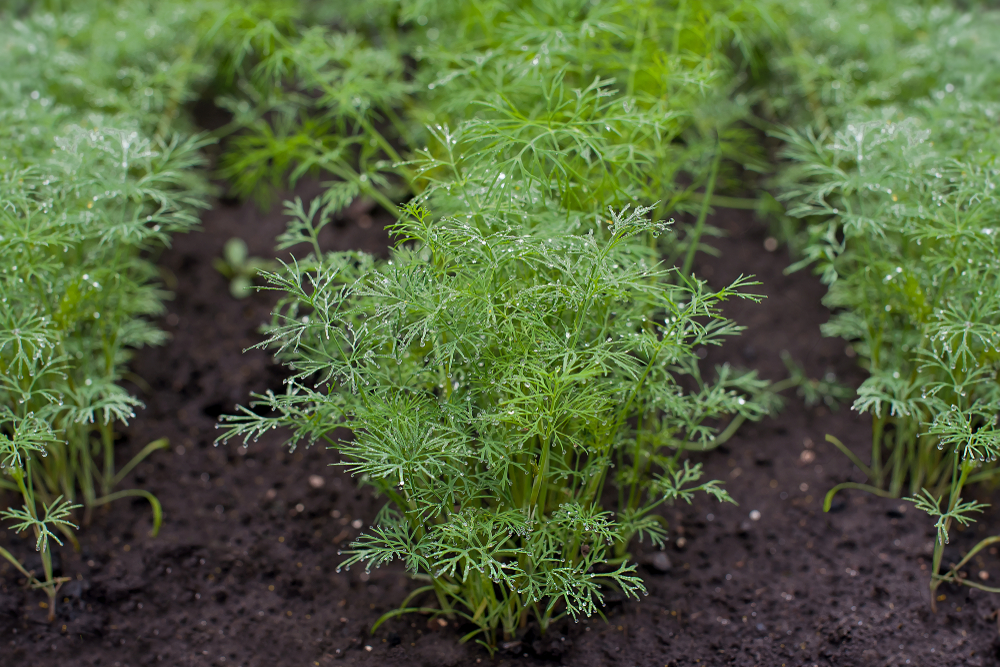
Dill is an herb that works well as a companion plant for sunflowers because it attracts predatory insects such as ladybugs and lacewings. These insects help keep aphid populations in check, preventing damage to the sunflowers. Dill takes about 2 months to grow and enjoys the same full-sun conditions as sunflowers. Its feathery leaves and delicate flowers add texture and beauty to the garden, complementing the boldness of the sunflowers. Dill’s pleasant aroma also enhances the overall garden atmosphere.
In addition to its pest control benefits, dill is an excellent herb for culinary use. It grows quickly, allowing gardeners to enjoy fresh dill leaves in salads, soups, or fish dishes. Dill’s tall, upright growth habit makes it a perfect companion for sunflowers, as it does not compete for space. The flowers of dill are particularly attractive to pollinators, helping to boost sunflower pollination. With minimal care, dill will thrive alongside your sunflowers and contribute to a balanced garden ecosystem.
Peas
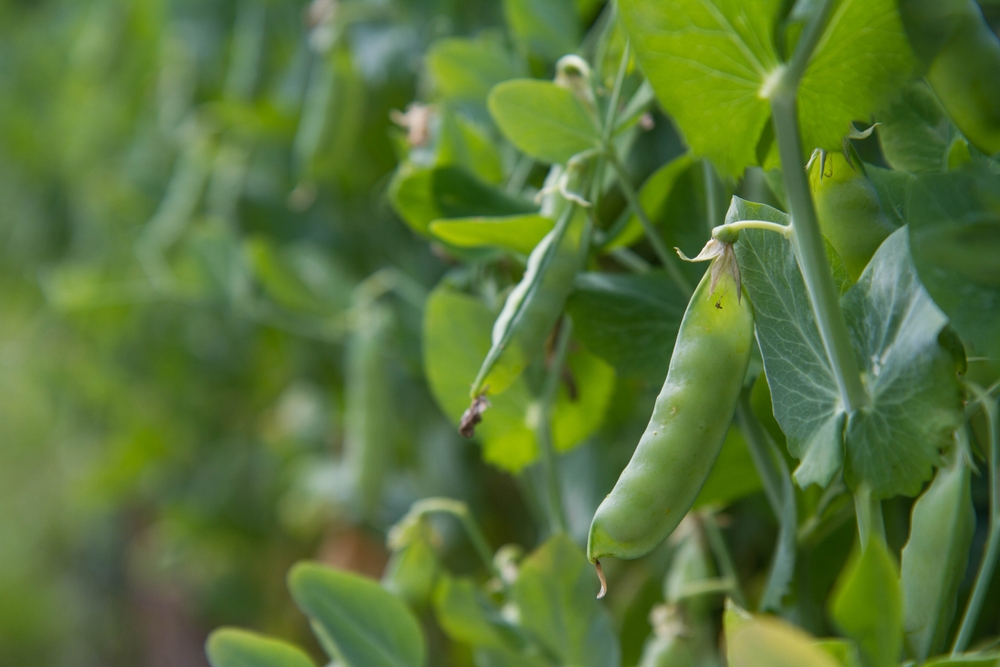
Peas are another great companion plant for sunflowers due to their ability to fix nitrogen in the soil. This process enriches the soil, providing sunflowers with the necessary nutrients to grow strong. Peas grow quickly, typically maturing in about 2-3 months, which makes them an excellent companion for sunflowers. Their climbing vines will wind around the sunflower stalks, providing natural support. Peas also produce edible pods, offering a tasty harvest in addition to their benefits for sunflowers.
Peas thrive in the same growing conditions as sunflowers, making them a perfect match. They benefit from full sun and well-draining soil, much like sunflowers. The peas’ roots fix nitrogen in the soil, enriching it and reducing the need for synthetic fertilizers. By growing alongside sunflowers, peas help to improve soil health while also providing a practical food source. Their growth pattern supports the sunflowers and helps prevent them from toppling over, especially in windy conditions.
Carrots

Carrots are an ideal companion for sunflowers because they help aerate the soil with their deep roots. This improves soil structure and ensures that water and nutrients are more easily available to the sunflowers. Carrots take about 3 months to mature, making them a long-term companion for sunflowers. The carrot foliage also helps to create a natural ground cover, which can prevent weeds from competing with sunflowers for nutrients. Additionally, carrots thrive in cooler soil, which works well with the sunflowers’ warmer conditions.
Carrots and sunflowers both benefit from the full sun and well-drained soil, making them compatible in the same garden bed. The deep roots of carrots break up the soil, improving overall soil health. The carrots’ green tops provide some shade to the soil, reducing evaporation and helping maintain moisture for the sunflowers. As the sunflowers grow tall, the carrots remain hidden beneath, making them a perfect ground-level companion. Carrots are easy to grow and require minimal maintenance, making them a great addition to any garden.
Thyme
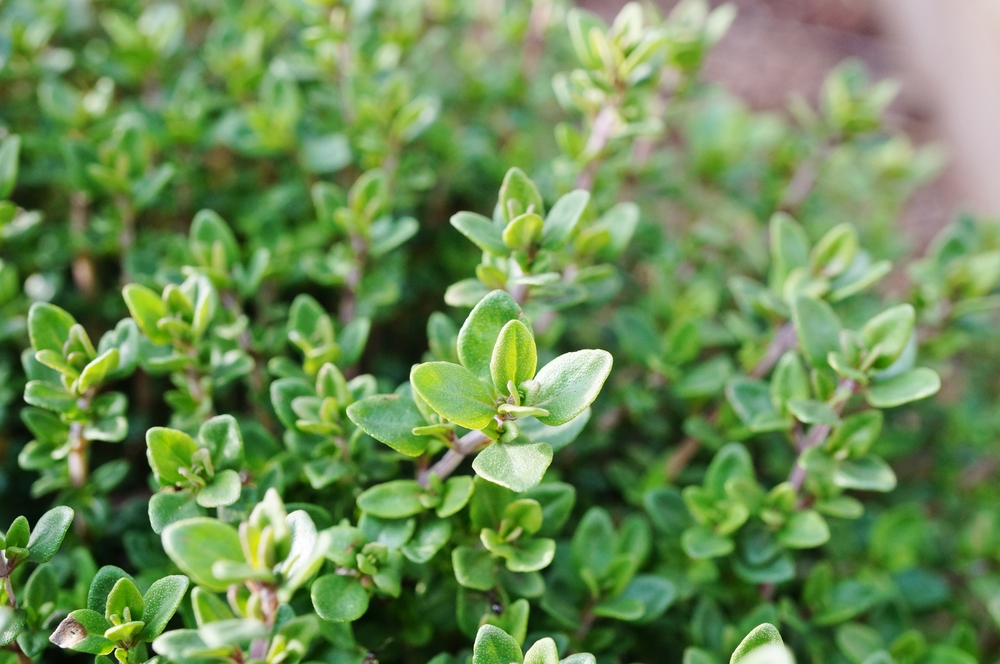
Thyme is a fragrant herb that pairs well with sunflowers by attracting beneficial insects such as bees, which help with pollination. It also repels harmful pests like aphids and whiteflies that might damage the sunflowers. Thyme typically takes about 2-3 months to grow, making it a quick and easy companion plant. Its low-growing nature does not compete with sunflowers for space, and it helps to suppress weeds around the sunflower base. Thyme’s strong scent also enhances the garden’s aroma.
In addition to its pest-repelling benefits, thyme is a valuable herb for culinary use. It thrives in the same sunny conditions as sunflowers and requires little water once established. Thyme’s compact growth habit allows it to fill in gaps in the garden, helping to create a more cohesive and attractive garden layout. It grows well in both containers and garden beds, making it a versatile companion plant for sunflowers. With minimal effort, thyme can enhance the health and beauty of your sunflower garden.
Oregano

Oregano is another herb that complements sunflowers well. It helps to repel pests such as aphids, mosquitoes, and certain beetles that might harm sunflowers. Oregano takes about 2 months to grow, and it thrives in sunny, well-drained soil, just like sunflowers. Its strong fragrance naturally deters pests, creating a healthier environment for sunflowers. Oregano’s spreading habit also helps to cover the soil and prevent weeds from competing with your sunflowers.
Oregano pairs beautifully with sunflowers due to its aromatic leaves and compact growth. It does not overshadow sunflowers, allowing both plants to grow without hindrance. As a perennial herb, oregano will continue to grow year after year, providing an ongoing benefit to your garden. Additionally, it attracts pollinators like bees, which improve sunflower yields. This hardy herb is low-maintenance and adds both culinary and garden benefits.
Lettuce

Lettuce is a great companion for sunflowers, as it grows quickly and enjoys similar soil conditions. It helps shade the soil at the base of the sunflowers, keeping the ground cool and moist. Lettuce typically takes 1-2 months to grow, providing a quick and easy crop. The shallow root system of lettuce does not compete with the sunflower roots for nutrients, making them an ideal pairing. Additionally, lettuce can be harvested early, giving more space for sunflowers to grow.
Lettuce benefits from the full sun and well-drained soil that sunflowers require, making them well-suited for companion planting. Lettuce also helps to reduce weed growth by covering the soil, and its fast-growing nature provides quick results for gardeners. The two plants do not compete for space, as the sunflowers grow tall while the lettuce remains closer to the ground. Lettuce’s ability to shade the soil around the sunflowers also helps to prevent soil drying out. This simple, low-maintenance companion plant is ideal for gardeners who want to maximize space and yield.
Radishes
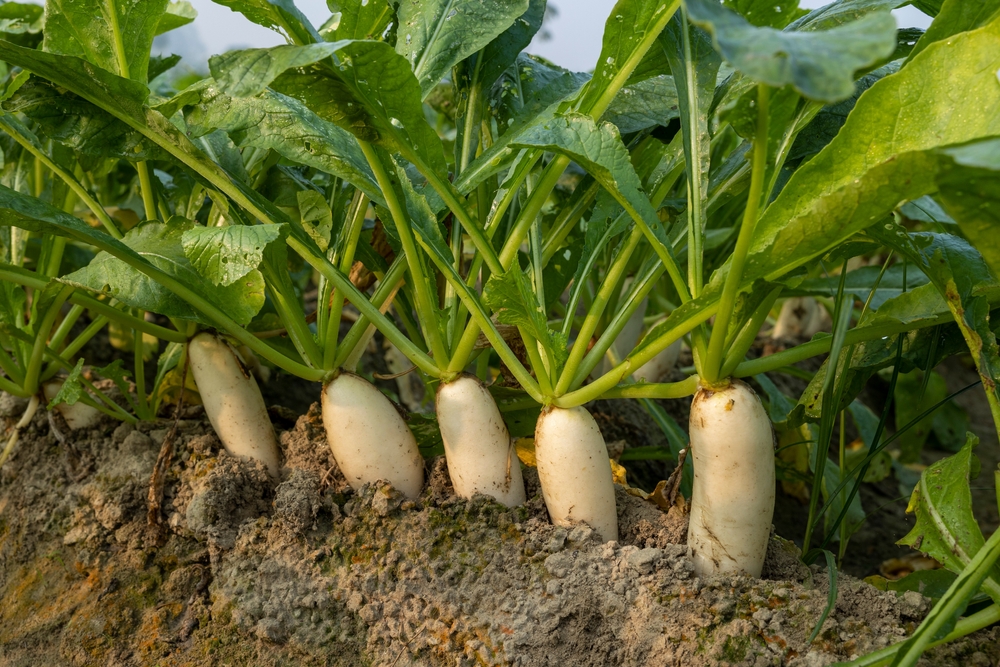
Radishes are a perfect companion for sunflowers because their fast-growing nature ensures they will not compete with the sunflowers for long. Radishes take only 1-2 months to mature, allowing them to grow and be harvested before the sunflowers reach full height. The deep roots of radishes help to loosen the soil, making it easier for sunflower roots to spread. Additionally, radishes can act as a natural pest repellent, as they help deter pests like aphids from attacking sunflowers. Their compact size makes them ideal for planting around the base of sunflowers.
Radishes grow well in similar conditions as sunflowers, enjoying full sun and well-draining soil. Their quick growth allows them to be harvested early, leaving plenty of space for sunflowers to flourish. Radishes also provide a natural form of pest control, which helps to protect the sunflowers from damage. Their root system improves the soil structure, making it easier for other plants to grow. Radishes are easy to grow, making them an excellent addition to any garden, particularly when paired with sunflowers.
Sage

Sage is an herb that provides natural pest control, making it an ideal companion for sunflowers. It helps repel insects like aphids and spider mites that could harm sunflowers. Sage typically takes 2-3 months to grow and prefers full sun, which aligns well with the growing conditions of sunflowers. It also enhances the flavor of many dishes, providing a culinary benefit. The grey-green leaves of sage add an attractive contrast to the yellow and green of sunflowers.
Sage is a hardy herb that grows well in most soil types, especially well-drained soil. It is drought-tolerant once established, requiring minimal maintenance. Sage’s ability to repel pests and attract pollinators like bees makes it an excellent choice for a companion plant. Its low-growing nature ensures that it will not compete with sunflowers for space or resources. The herb can be used in cooking, making it both a practical and decorative plant in the garden.
Chives
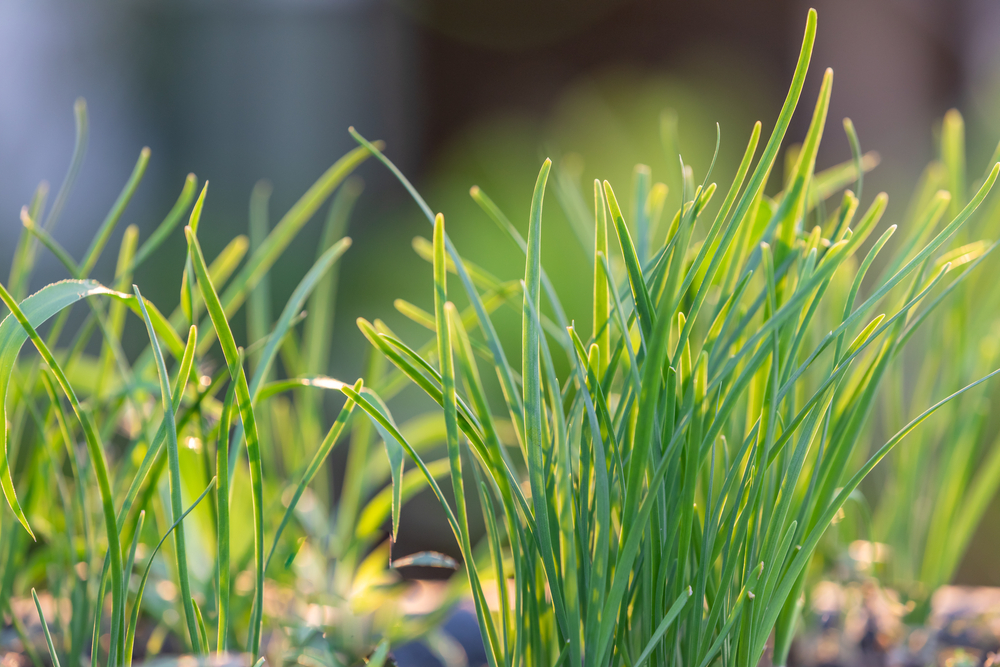
Chives make a great companion for sunflowers due to their pest-repelling qualities. They help keep aphids and other harmful insects away from the sunflowers. Chives grow quickly, typically taking about 2-3 months to mature. Their tall, thin stems do not compete with sunflowers for space, making them an ideal plant to grow alongside sunflowers. Chives also attract pollinators, which can increase the pollination rate for your sunflowers.
Chives thrive in full sun and well-draining soil, making them well-suited for companion planting with sunflowers. Their mild onion flavor can be used in cooking, adding extra value to the garden. The purple flowers of chives also add a pop of color to the garden, complementing the bright yellow petals of the sunflowers. These plants are low-maintenance and grow well in containers or garden beds. Chives are an easy-to-grow companion that will help keep your sunflowers healthy and productive.
Sweet Alyssum
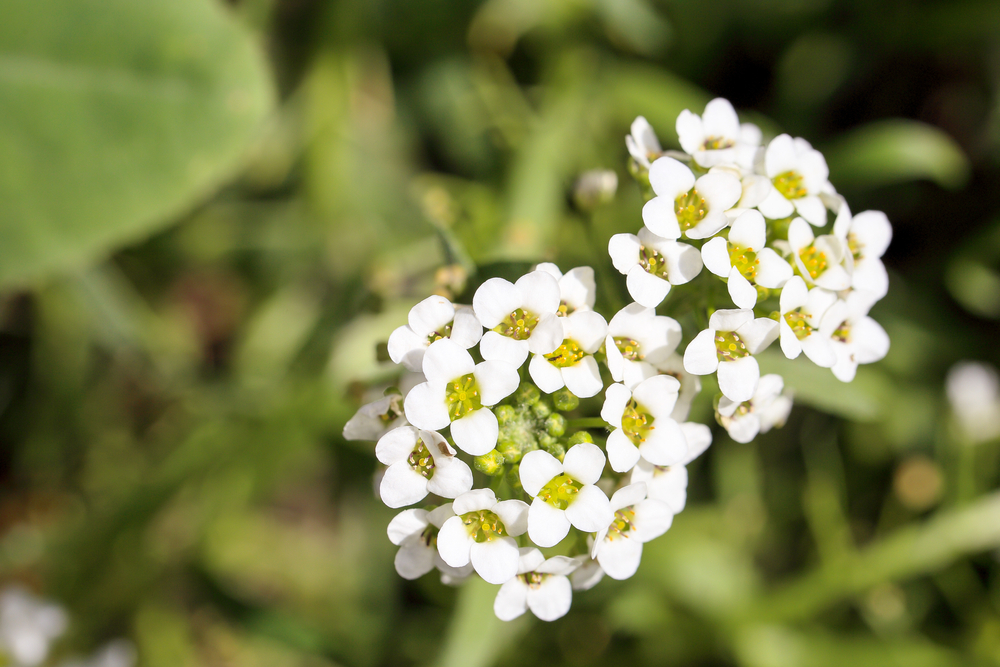
Sweet alyssum is a low-growing plant that serves as an excellent companion for sunflowers. It attracts pollinators such as bees and butterflies, which are crucial for sunflower pollination. Sweet alyssum typically takes 2 months to grow, making it a quick-growing companion. Its fragrant white flowers provide a pleasant scent that enhances the garden environment. It also helps to keep the soil moist, which is beneficial for sunflowers during dry periods.
Sweet alyssum thrives in full sun and well-drained soil, making it compatible with sunflower growth conditions. It can be used as a ground cover around sunflowers, preventing weed growth and improving overall soil health. The small size of sweet alyssum ensures it does not compete for space with sunflowers, and its spreading habit helps to fill in gaps. This plant is easy to grow and requires little maintenance, making it perfect for gardeners looking for a low-maintenance companion. Sweet alyssum’s ability to attract pollinators and protect the soil makes it a valuable addition to your sunflower garden.
Pairing sunflowers with the right companions offers numerous benefits, from improved pollination to natural pest control. These plants work together to create a balanced and thriving garden. With a little planning, you can enhance the beauty and health of your sunflower garden. Take advantage of nature’s partnerships to boost your garden’s productivity and enjoyment.
This article originally appeared on Avocadu.
